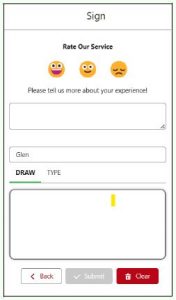Grasping the significance of customer feedback is revolutionizing field service management. Swift responses following a service encounter empower businesses to immediately address service issues, thus elevating service quality and boosting customer satisfaction rates. As the demand for quick action on feedback grows, the ability to resolve customer grievances promptly has become crucial in fostering customer loyalty and maintaining high customer satisfaction.
In an era where each review can sway a business’s reputation, the impact of customer feedback on revenue is unmistakable, with affirmative reviews potentially increasing profits by 5-9%. The forthcoming years are poised to witness customer feedback as a cornerstone in shaping field service strategies, incorporating cutting-edge route optimization and predictive analytics to enhance operations. This discourse will explore the pivotal role of feedback management through field service management software and other methodologies, illustrating how the strategic gathering and analysis of feedback can advance a field service enterprise.

The Impact of Feedback and Reviews on Field Service Management Growth
- Leveraging real-time customer feedback is an influential strategy for field service entities, allowing them to swiftly tackle service issues and avert the escalation of smaller problems.
- By analyzing customer preferences and aversions, companies can identify opportunities for service improvement and growth, refining their offerings to align more closely with customer expectations.
- Showcasing dedication to customer experiences by collecting real-time feedback can markedly improve customer retention and satisfaction, nurturing a devoted clientele.
- The pivotal role of online reviews and ratings is evident in their ability to shape the reputation of field service providers, influencing both customer acquisition and retention, and ultimately impacting the company’s financial performance.
- Positive reviews act as a modern form of digital word-of-mouth, enhancing a company’s search ranking and broadcasting the caliber of their services to prospective clients.
- Proactively managing online reviews and constructively addressing negative feedback can bolster service offerings and solidify a more robust market presence. This approach to online reputation management is pivotal for service enhancement and business growth.
- Amidst economic challenges, prioritizing customer experience, especially within field service sectors, is crucial for catalyzing revenue growth and fostering business resilience. Investing in customer relations is a strategic move to navigate financial uncertainties.
- Field service teams play a pivotal role in driving sales and elevating customer service, with adept workers leveraging direct customer interactions to uncover valuable sales opportunities. Their contribution is key to expanding business and enhancing customer relations.
- The deployment of cutting-edge field service software is instrumental in elevating customer satisfaction, optimizing service management, and refining operational efficiencies such as invoicing and communication.
- A customer’s encounter with field service operations can significantly shape their overall impression of a company, influencing key factors like satisfaction, retention, and the likelihood of future sales. This underscores the importance of exceptional field service delivery.
- For businesses intent on improving the customer journey and securing their customer base, optimizing key customer touchpoints, particularly during field service interactions, is vital. Such enhancements are central to a successful customer retention strategy.
- Technological advancements within field service organizations, including automation and better access to service-related information, contribute to heightened productivity and enriched customer experiences. These innovations are transforming the landscape of customer service.
- Customers increasingly seek personalized service, and many show a willingness to invest more for the convenience of precise service times, aligning with their expectations for connected service experiences.
- Elevating customer satisfaction and retention can be achieved by investing in ongoing training for field service technicians, equipping them with collaboration tools, and ensuring they have access to detailed customer information.
- Customer satisfaction surveys serve as a direct barometer of customer perception, and achieving high levels of satisfaction can set a business apart in a competitive market.
- While negative reviews can be detrimental, they also present an opportunity for businesses to showcase their dedication to service quality and their commitment to resolving customer issues.
- Gathering customer feedback is crucial for field service businesses to comprehend and cater to the distinct needs and preferences of their clientele, thereby maintaining a competitive edge.
- Incorporating feedback loops into operations fosters continuous improvement, enabling businesses to surpass customer expectations and enhance their service delivery.
- Leveraging customer feedback is instrumental in uncovering pain points, offering valuable insights, and assisting businesses in refining their services, which in turn promotes growth and bolsters customer satisfaction.
To gain deeper insights into enhancing field service management with customer feedback, delve into our tailored solutions available on Salesforce AppExchange.
Incorporating Feedback for Field Service Management Improvement

Adopting a multifaceted approach to field service improvement, we incorporate feedback through a series of strategic measures.
- Optimization through Real-Time Feedback:
-
- Leveraging customer feedback, we refine route optimization algorithms to deliver more efficient and customer-centric service by 2025.
- Through the integration of feedback, predictive modeling anticipates the effects of route optimization on customer satisfaction.
- Dynamic route optimization, guided by real-time feedback, enables service adjustments that cater to customer preferences.
- Continuous Improvement and Cost Savings:
-
- Identification of inefficiencies through customer feedback leads to cost savings and better service delivery.
- Feedback drives systematic revisions to routing strategies, highlighting bottlenecks and promoting continuous improvement.
- Utilizing real-time feedback, we prevent negative word of mouth, build stronger customer relationships, and elevate service quality.
- Leveraging Technology for Enhanced Customer Experience:
-
- Field service software solutions, such as FieldAx and Field Service Lightning, are instrumental in capturing and managing customer feedback promptly for swift problem resolution.
- Leveraging multiple communication channels, including phone and online portals, enhances effective communication and bolsters customer self-service options.
- Incorporating geofencing and augmented reality technologies into operations offers precise job tracking and fosters expert collaboration, which are key to elevating service delivery.
Strategies for Encouraging Customer Feedback

- Regular Feedback Requests Actively soliciting customer input through various means, such as follow-up emails, phone calls, or during service visits, underscores the value placed on their opinions and drives service improvements.
- Ease of Access By providing an array of feedback channels like online forms, comment cards, or dedicated phone lines, businesses simplify the process for customers to share their customer experiences, while user-friendly interfaces encourage broader participation.
- Prompt Responses Promptly addressing customer feedback is a testament to a company’s dedication to service quality and customer care, with the potential to transform negative experiences into positive testimonials by showing customers they are heard.
- Personalized Interactions Delivering personalized experiences, from using customers’ names to remembering their preferences, makes customers feel valued and more likely to provide customer feedback, thereby enhancing the customer-business relationship.
- Feedback-Focused Marketing Utilizing targeted advertising to underscore the significance of customer feedback not only educates customers about their pivotal role in refining services but also motivates them to share their insights.
- Review Encouragement Proactively motivating customers to post customer reviews and engaging with each one can enhance both the feedback quantity and its quality. This demonstrates to potential clients that the business is committed to valuing and learning from their experiences.
- Technician Involvement Field staff can significantly contribute to feedback collection by equipping them with review request cards or QR codes, making it easy for clients to leave their impressions. Offering incentives to employees who effectively promote reviews can foster a more dynamic feedback collection strategy.
- Training for Feedback Collection Training technicians to discern the optimal moment for soliciting reviews, by recognizing customer satisfaction cues, can amplify the likelihood of obtaining valuable feedback. They should be adept at asking for feedback in a manner that is considerate and non-disruptive.
- Highlighting Expertise Urging clients to highlight particular strengths in their customer reviews can showcase the service expertise and professionalism of the technicians. This strategy can captivate new clients who are in search of top-notch service.
- Referral Encouragement Harnessing the power of positive reviews can significantly boost business referrals. By expressing gratitude for customer feedback and suggesting they share their favorable experiences, businesses can leverage word-of-mouth to attract new clientele.
Managing Negative Feedback Constructively
- Listening and Acknowledging Addressing customer dissatisfaction involves actively listening and validating their concerns without defensiveness, confrontation, or assigning blame. Demonstrating sincere empathy and a readiness to address service issues can transform a negative encounter into a constructive one.
Engaging in empathetic customer dialogue, such as saying, ‘I hear what you’re saying, and I understand why this is upsetting for you. Let’s collaborate on a service resolution,’ can be a pivotal step in mending customer relationships.
- Effective Communication Maintain clear, polite, and effective customer communication, ensuring that customers are consistently informed about the service progress of their issue. Steer clear of technical jargon and confirm that the customer is aware of and agrees with the proposed solutions, setting realistic expectations along the way.
We’re diligently working on the service issue resolution and will provide you with regular customer updates. Rest assured, you’ll be informed about every development.
- Empathy in Action Employing empathy is crucial when addressing negative feedback. Use empathetic language and non-verbal cues to convey your understanding of the customer’s concerns and your commitment to resolving their issue.
I value your customer patience as we work towards a service resolution, and I completely understand why this situation is frustrating for you.
- Solution Follow-Up After rectifying the service issue, it’s important to conduct a service follow-up to gauge customer satisfaction. Show appreciation for their patronage, solicit their feedback for future improvements, and encourage them to get in touch should they need more assistance.
Thank you for giving us the chance to rectify the situation. Your customer gratitude is much appreciated, and we’d be grateful for a feedback invitation to understand how we could better manage your concerns.
- Review Response Actively respond to all reviews to showcase your commitment to customer engagement. Address any negative feedback swiftly and with professionalism, reinforcing the message that every customer’s experience is valued by your business.
We regret to hear about your experience and are eager to understand more for enhancing our services. To facilitate better customer engagement, we invite you to reach out to us at your earliest convenience, allowing us to address your negative feedback response constructively.
Leveraging Reviews to Boost Your Marketing Efforts
- Integrate Reviews into Marketing Leveraging customer review management systems can significantly boost the efficacy of marketing campaigns. By highlighting these reviews in marketing materials, companies can demonstrate authentic customer satisfaction and foster trust with prospective clients.
- Claim and Update Business Profiles Claiming and maintaining up-to-date online profiles on platforms like Google My Business and Yelp is crucial for businesses aiming to present themselves effectively. Featuring positive reviews on these profiles, as well as on the company’s website and social media, can draw in new customers and solidify the business’s reputation.
- Monitor and Manage Online Reputation Continuous monitoring of review platforms is vital for staying abreast of customer perceptions. Utilizing online reputation management tools can streamline the review tracking process and facilitate swift, efficient responses to customer feedback.
- Showcase Customer Testimonials Establishing a dedicated page for customer testimonials on your website and showcasing positive feedback on social media can act as compelling social proof. These testimonials can significantly sway the decision-making of potential customers.
- Automate Follow-Ups with Field Service Software Field service software like FieldAx offers Review Management features that automate customer follow-ups. This innovative technology can transform a single service experience into ongoing customer engagement, ensuring your business remains a preferred choice for clients.
- Explore Our Solutions on Salesforce AppExchange For businesses seeking to integrate customer feedback more deeply into their marketing efforts, our offerings on Salesforce AppExchange provide the tools you need. We invite you to discover how our solutions can support your goals in this domain.
The Role of Field Service Software in Managing Feedback and Reviews
- Field service management software like FieldAx enhances customer interactions by personalizing and optimizing service delivery, ensuring that field service companies not only meet but also surpass customer expectations.
- FieldAx Software provides invaluable asset for field service management teams, offering a direct channel for customer feedback that is instrumental in refining daily operations and elevating customer satisfaction and loyalty.
- Field service CRM systems are pivotal in negative feedback management, empowering companies to swiftly tackle issues and sustain a competitive advantage through the provision of customized, efficient services.
- Key Performance Indicators (KPIs) such as first-time fix rates, customer feedback scores, and service completion times are meticulously tracked by field service management software, propelling enhancements in service quality.
- Technological solutions like FieldAx revolutionize field service delivery by optimizing scheduling, monitoring performance, and streamlining task assignments, resulting in a marked upgrade in service efficiency.
- The automation of processes, including work order generation and scheduling through field service management software, guarantees punctual services, ideal scheduling, and judicious resource utilization, all of which are crucial for upholding customer satisfaction.
- Real-time tracking capabilities and digital forms offered by field service software promote orderly workflows and maintain customer transparency, thereby fostering trust and bolstering customer loyalty.
- Integrated field service suites elevate the customer experience by enhancing communication, invoicing, and tracking capabilities. These comprehensive tools extend customer engagement beyond the service call, fostering a more holistic interaction with the company.
- For organizations aiming to incorporate field service management software into their workflow, the Salesforce AppExchange offers a plethora of solutions that streamline feedback management and review processes, equipping businesses with the necessary tools for success.
See how FieldAx can transform your Field Operations.
Try it today! Book Demo
You are one click away from your customized FieldAx Demo!
Conclusion
Customer feedback, a critical component of field service management, mirrors customer satisfaction and carves a path for ongoing enhancement. Recognizing its significance, we’ve examined how collecting and leveraging feedback effectively can fuel growth, spur innovation, and enhance revenue streams. By valuing and acting upon customer opinions, businesses can refine their services and cultivate lasting customer relationships, which are fundamental to a company’s reputation and prosperity.
As the field service sector progresses, embracing technological advancements like real-time analytics, predictive modeling, and sophisticated field service software is crucial. These innovations promote smooth operations and tailored customer interactions, which are essential for exceptional service experiences. To position your field service enterprise at the forefront, we advocate for the strategic use of feedback and invite you to discover our cutting-edge solutions.Salesforce AppExchange. For any further inquiries or customized assistance, feel free to reach out to us, and let’s elevate your service management together.
FAQs
What does customer feedback contribute to a business?
Customer feedback, the insights and opinions from clients, is a vital tool for gauging customer satisfaction and refining the customer experience. This valuable input enables companies to adjust their actions to better fulfill customer needs and enhance their overall interaction with the brand.
What is the purpose of a customer feedback system?
A customer feedback system is designed to capture customer insights, shedding light on their needs, preferences, and customer expectations. By tapping into this information, businesses can tailor their offerings and customer experiences to align more closely with what their clientele seeks.
Why is customer feedback critical during product development for a company?
In the realm of product development, customer feedback is indispensable as it signals shifts in market trends and provides insight into consumer needs and preferences. This feedback is instrumental in identifying new growth opportunities and in understanding customer behavior and expectations, thus guiding companies to make strategic product or service decisions.
What does customer feedback management entail?
Customer Feedback Management (CFM), a pivotal component of business improvements, is the strategic process of collecting and analyzing customer insights to drive product development. By harnessing the power of Customer Feedback Management, businesses can refine their offerings and champion positive transformations that resonate with consumer needs.
Author Bio
Co-Founder & CMO at Merfantz Technologies Pvt Ltd | Marketing Manager for FieldAx Field Service Software | Salesforce All-Star Ranger and Community Contributor | Salesforce Content Creation for Knowledge Sharing






